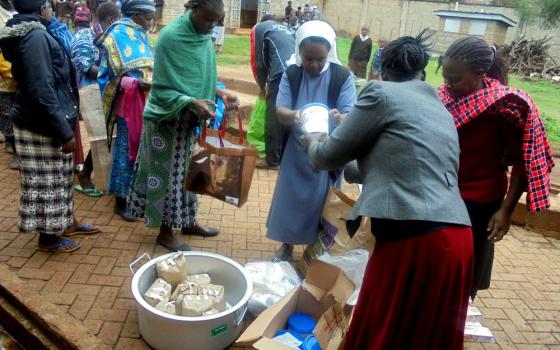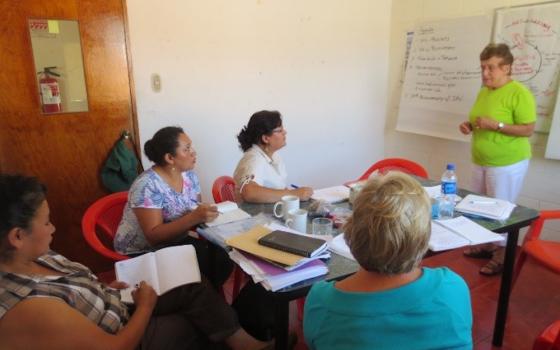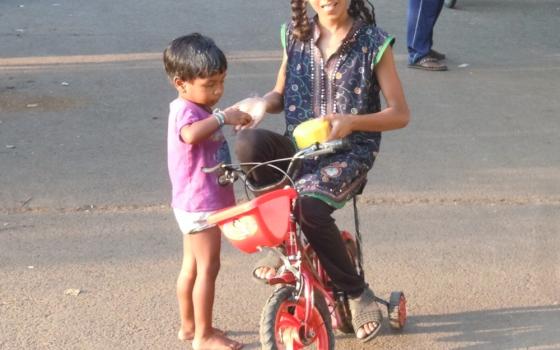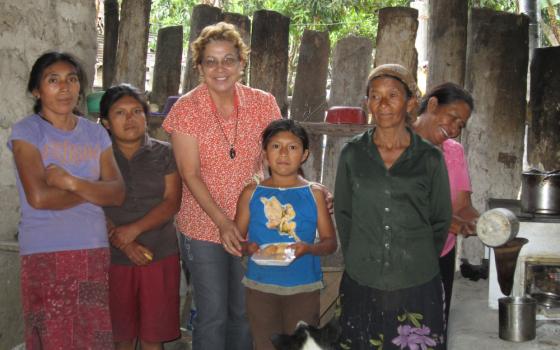This month, the panelists shared some of their congregational ministries with women, describing how they meet the special needs of this vulnerable half of humanity in various places around the world, especially those experiencing war and violence.
Two things they agreed on: Education is a powerful shield against poverty, and peace is a key ingredient to a prosperous and happy life. The panel responded to the following question:
Women seem to always get the worst of the world's crises. How does your congregation help women deal with the effects of poverty, war, terrorism or violence?
______

Christine Nasimiyu Masivo is a Missionary Sister of the Precious Blood. After formation studies in Tanzania and Canada, she worked at radio stations in Kenya and Uganda as a reporter, editor, news director, producer and news anchor. She is now with Capuchin TV and pursuing graduate studies in communication.
Many women in the slums of Kawangware in Nairobi, Kenya, are especially vulnerable because of their terrible life situations. Poverty and violence are the most common issues.
These women are single mothers or the wives of drunkards or husbands who do not care about their families. Some of the men were violently abusive toward them or drank so much they could not provide for their families.
The women who care about their children's education struggle to keep them in school. This has led some of them to become involved in unhealthy practices that are very risky to their health, such as drugs and prostitution, for the sake of keeping their children in school.
Sometimes, the women seem not to know what to do because of the immense rate of poverty and the high cost of living in the country.
The Missionary Sisters of the Precious Blood live in this area and have been of great help and support to these women. For example, Sr. Anne Grace leads a team that tries to bring the women together to help them help themselves and live a decent life.
The concept of microfinance was introduced to these women, and they adopted it gratefully. They give 50 Kenyan shillings monthly to the group pot to become a member, then they are allowed to take out small loans that enable them to start small businesses.
A number of them have been faithful to this project and have started small businesses for selling fruit and vegetables. Now, they can provide food for the family and school supplies for their kids. We sisters provide the children with school fees and other educational expenses, which are very hard for them to meet.
The Missionary Sisters of the Precious Blood in Kenya took this initiative because we thought helping the women was key to solving many problems. Because of the abuse they suffered from their husbands, the women would end up neglecting their children, who would run away to the streets of Nairobi and eventually become victims of drug abuse and prostitution.
By helping the women, we prevent a variety of social problems.

Cynthia Mathew is a member of the Congregation of Jesus. A social worker and lawyer, she worked in India with the Dalit people, prisoners and women, and she practiced law in the Patna High Court with juvenile delinquents and victims of rape and domestic violence. She is now the nongovernmental organization representative to the United Nations for her congregation.
I feel proud to belong to the Congregation of Jesus, part of the family founded in 1609 by Venerable Mary Ward, who worked for the empowerment of women and girls in her time and prophesied that "women in time to come will do much."
Women make up more than two-thirds of the world's 796 million illiterate people.
Gender inequality is a major cause and effect of hunger and poverty: The World Food Program estimated that 60 percent of chronically hungry people are women and girls.
Another estimate indicates that 35 percent of women worldwide have experienced physical and/or sexual violence from a partner or sexual violence from a nonpartner at some point in their lives.
The formal and informal education of girls and young women is a key ministry of ours, especially in parts of the world where they are deprived of the opportunity of an education. We also do a variety of social ministries to empower women.
Empowerment of girls and women helps them resist violence and extreme poverty and demand their rights, and together with them, we challenge unjust social structures. We help them seek gender justice through our legal and counseling ministry.
For example, I worked in India with Dalit ("untouchable") women who suffer extreme poverty and violence. Once, I provided legal aid to a woman seeking help for her mentally challenged daughter, who had been raped. With legal help, she was able to access free health services for her daughter and her daughter's baby.
We are also involved in health care and do advocacy and prison ministry. Our sisters work with the homeless, migrants and asylum-seekers and rescue and protect young people from bonded labor and trafficking. In areas of conflict, we care for orphans and other children in need of residential care.
Thus, the congregation founded for women by a woman has become a ray of hope, especially for women living in vulnerable situations all over the world today.
We Congregation of Jesus sisters see mission as a participation in the sending of Christ into the world: "As the father has sent me, so I send you" (John 20:21).

MarieJosee Seide is a member of the Daughters of Wisdom. Before she became a sister, she worked in Haiti for USAID, the International Development Bank, and the National Olympic Committee. In community, she worked in administration at a school for gifted children and now directs parish social ministries in Amityville, New York.
In the midst of chaos, God always provides ways to move from brokenness to wholeness, from despair to new life.
Called by Divine Wisdom to care for the marginalized, especially women and children, we Daughters of Wisdom broadened the space of our tent to minister to them in different ways, helping spark the fire that lies beneath the ashes of their brokenness.
In Lewiston, Maine, in 1999, three of our sisters (Irene Arsenault, Maureen Hurley and Mona Guerrette) launched a center to assist marginalized women of all ages who are dealing with poverty, loneliness, physical abuse, addiction or mental illness.
Before leaving nine years later, the sisters had served 1,000 women and logged over 22,000 visits. To this day, the Center for Wisdom's Women is a place where wounded women are cared for and empowered by other women. The new director, an associate of the Daughters of Wisdom, together with a board of female volunteers continues the work the sisters started, offering resources of spiritual accompaniment, craft-making and group support.
Through the financial support of our congregation and other sponsors, this wonderful ministry of kindness, compassion and empowerment of women continues to create a community where loneliness and despair are banished.
In 2003, Sr. Mary Chiodo collaborated with Sr. Anne Marie Gardiner, a School Sister of Notre Dame, in developing in partnership with , another not-for-profit organization working to empower women in the war-torn nation of El Salvador.
With the financial support received, women can become small-business owners, raising chickens, growing indigo, making organic fertilizer, making cheese, or sewing. Besides education and training, the kindness, respect, care and attention they experience build self-confidence and help them develop their full potential.
Each year, Sr. Evelyn Lamoureux with the of Long Island sponsors hundreds of birthing kits, which are sent to Haiti and Nigeria to be used by midwives in rural areas.
Our sisters in Huntington Station New York partner with Dominican Sisters in the Opening Word an English-as-a-second-language program, helping empower women from the neighborhood Hispanic community.
These examples reveal the beauty of women treasured by other women who know how to "walk the talk" of the love for neighbor preached by the Gospel of Mark (12:31).

Jane Quinlan is a member of the Ursuline Sisters of Tildonk, U.S. Province. A teacher, missionary to the Democratic Republic of Congo, and vocation minister, she later represented her order at the United Nations. She now serves in Brussels as assistant general superior of her congregation.
"Let me take refuge under the shelter of your wings" (Psalms 61).
Women on a mission fascinate me. Two head the list of great Ursuline sisters and saints. Each heard an inner voice saying, "Go for it! You can do it! Give it your all!"
Angela Merici in Brescia, Italy, in the 1500s and Marie of the Incarnation in Quebec in the 1600s decided to tackle issues of their times, particularly the support, care and education for girls and women.
Twenty-first century Ursulines still respond to this voice by providing services for victims of contemporary problems: human trafficking, domestic slavery and other forms of violence.
For example: Vast, beautiful India holds promise for the few who complete studies and find jobs. Too many never achieve this dream, but appealing promises of salaried domestic work suffice to lure many young women from village to city, where they may be vulnerable to trafficking or other violations of their human rights.
One Ursuline who heard the voice saying "Go for it!" now makes a difference in the lives of these young women working in housekeeping, child care and elder care. This sister leads domestic workers in discussions of working conditions and related issues.
She works on a team of social workers in Seva Kendra in the Kolkata Archdiocese, bringing hope and healing to the disadvantaged. The outreach programs combat child labor, early marriage and human trafficking while promoting skill development, safe migration and peace-building.
Such faith and boundless love may escape the spotlight, but these sisters are living Jesus' words, "The Son of Man came not to be served but to serve" (Matthew 20:28).

Kathie Shea is a Medical Missionary of Mary. She served her congregation's financial needs at the local, area and congregational levels in the United States, Ireland and Kenya. Now in their Chicago development office, she is the congregation's business administrator for Brazil, Honduras and the United States.
My congregation, the Medical Missionaries of Mary, was founded in Nigeria in 1937 by a woman from Ireland who had great care and concern for the health of women and their children. As a result, our sisters are trained in various aspects of the healing profession, especially as nurses and midwives.
Our congregational documents and leadership remind us as Medical Missionaries of Mary sisters and associates "to be present to the peoples of today and to live in solidarity with those who suffer." In recent years, this has led our congregation to expand our understanding of healing.
In Brazil, where we have a center, we have discovered that art, language and music can be a source of healing for women who suffer from the trauma of losing their children to violence. We have been told by some of these women that using their hands to produce art helps them to think positively of themselves and to socialize.
In Honduras, one of the poorest countries in Latin America and where there is a tremendous amount of violence, we work with women on issues of heath, human development, human rights, violence, gender and care of the environment. Many of these women come from families that have been affected by violence and drugs.
As Medical Missionaries of Mary, we endeavor to go where human needs are the greatest. One such country was Rwanda; we were asked to send sisters there after the genocide in 1994. In Butare, we became involved in health and rehabilitation of women and children. Later, we moved to a rural area of the country called Kirambi. The situation in the country for many years, especially for women and their children, was fragile. We worked for 23 years to establish hope, harmony and peace in this area.
In 2013, we set off for Wau, South Sudan. There, our sisters met the aftermath of a war that had gone on for a number of years. The sisters who work there today are from three different countries, bringing God's healing love and compassion.
This May, on a feast day special for our congregation (the feast of the Visitation), we opened the MMM Healing Center in Eastern Bank, Wau, South Sudan. Here, our charism of healing love is once again taking root.

Adelaide Ndilu is a member of the Sisters of the Immaculate Heart of Mary in Kenya. After careers as teacher, administrator and secretary, she studied mass communication. She now produces stories on church and justice topics for Radio Waumini, a Nairobi Catholic radio station.
Sometimes, I see desperation on people's faces. In Kenya today, the talk all over the media is about the importation of sugar contaminated with mercury and copper, very harmful to humans. In early June, it was the corruption of the mighty and powerful in government, who took billions of Kenya shillings, leading to more poverty.
In such scenarios, women suffer most. According to the Kenya Integrated Household Budget Survey of 2005-2006, poverty among women is higher in both rural (50 percent) and urban (46 percent) areas.
That is why the mention of Immaculate Heart of Mary Sisters Celine and Marcel makes the women of Jasho D Block in the outskirts of Eldoret, Kenya, chuckle, nod and affirm, "hawa ni masister wetu" ("these are our sisters") because the sisters came to their assistance in their time of need.
The women once led happy and contented lives as employees of the East African Tanning Extract Company in Eldoret until its closure in 2003. At once, their hopes were dashed, and they could do nothing but sit in small groups along the dusty road, waiting to be employed as casual workers for a day's wage. Yet not even that was assured.
This is how Sisters Celine and Marcel found them: As the sisters walked from one homestead to another, the women all had one cry — no food, no school fees, alcoholic husbands, teenage pregnancies leading to early marriages and school dropouts, and a whole litany of suffering.
The sisters did not promise the women that bread would fall like manna from heaven. No! They promised them hard work and enrolled six of them in a six-month training course in knitting, tailoring, making baskets, and the like. The six returned and started training the others.
The sisters organized seminars for the women on hygiene and the importance of educating their children, which had never been a priority. The women now have a garden where they plant vegetables, and thanks to microfinancing, now they can boast of owning bank accounts.
The sisters also approached the county community and government leaders about getting the children back to school. The children, previously infected by jiggers because of unhygienic conditions, are now healed and able to go to school.
This is an example of how our congregation responds to women's needs — through our own women like Sisters Celine and Marcel!






